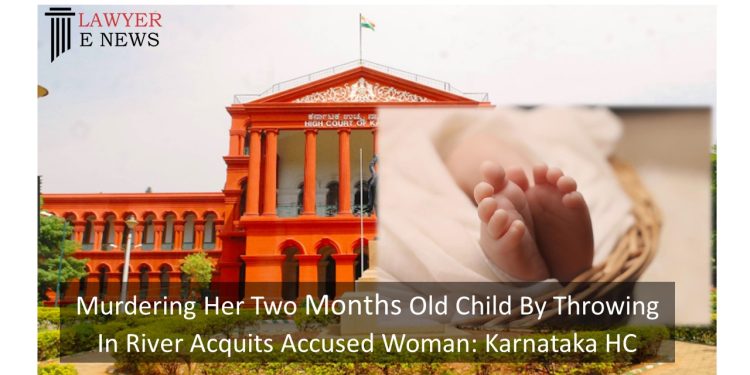Murdering Her Two Months Old Child By Throwing In River Acquits Accused Woman: Karnataka HC

D.D: 08 JUNE 2022
The Karnataka High Court recently overturned the conviction and life sentence imposed on a woman for allegedly causing the death of her two-month-old daughter with epilepsy and respiratory problems by throwing her into a river.
Justices KS Somashekar and Shivashankar Amarannavar acquitted Kavitha, who had been detained for six years for violating Section 302 of the Indian Penal Code. The judge ordered her immediate release from prison if she was not wanted in another case.
Based on the complaint filed by the child’s father, Manjunatha, the criminal law was put into effect.
The prosecution examined fifteen witnesses, while the defendant denied the evidence of guilt. She did not, however, present any defence evidence.
Subsequently, the trial Court, heavily relying on the testimony of the child’s doctor, the doctor who conducted her autopsy, and the Investigating Officer, concluded that the prosecution has proven its case against the accused for the section 302 IPC-punishable offence. The court noted that based on the circumstances and evidence presented, the only conclusion that can be drawn from the completed chain of events is that the defendant threw the child into the river and killed her.
Advocate RP Chandrashekar, representing the woman in her appeal, alleged that her husband and the child’s father, who had filed the complaint, had become hostile. Further, it was alleged that the testimony of her child’s doctor does not support the prosecution’s claim that she caused the death of her child.
In addition, it was asserted that the witnesses examined by the prosecution to prove the last seen theory had become hostile and no longer supported the prosecution.
Supplemental SPP Vijaykumar Majage, on the other hand, argued that the accused threw the child because it had breathing problems and epilepsy and because she did not have enough milk to feed it. It was argued that the defendant knew a two-month-old infant would drown in the river and that she threw the infant with the intent to kill.
The bench cited the Supreme Court’s decision in Lalit Kumar & Ors. v. Superintendent & Remembrancer, AIR 1989 SC 2134, in which it is held that an Appellate Court’s power to review evidence in appeals against acquittal is as extensive as its power in appeals against convictions, but the Appellate Court should always be re-evaluating the evidence and revisiting the entire evidence as well as marking of the documents to prove the guilt again.
It then stated, “In the instant case, the Trial Court gave more weight to the testimony of PW.3 (the child’s doctor), PW.14 (the autopsy doctor), and PW.15 (the investigating officer).”
The Supreme Court emphasised that the quality of evidence, not the quantity of evidence, should determine the court’s verdict. In addition, the court opined that a single witness’s statement can only be considered if the court determines that it is the true and accurate version of the case.
In this regard, the Court stated:
“The importance of corroborating the evidence provided by the prosecution in this case is that it must be conclusive, convincing, consistent, and probable that the accused murdered the deceased. In contrast, in the present case, Kavitha, who is the mother of the two-month-old infant who died, despite the prosecution’s examination of PW.1 through PW.15 in their case against this accused, no credible evidence has been presented to secure the conviction of the accused for the violation of section 302 of the Indian Penal Code, 1860.”
Consequently, it held, “Therefore, intervention is required in this appeal. If not intervened by a reevaluation of the evidence and a reconsideration of the conviction and sentence, there will undoubtedly be a grave miscarriage of justice against the defendant, who is the subject of the accusations.”
Kavitha
v.
State of Karnataka





